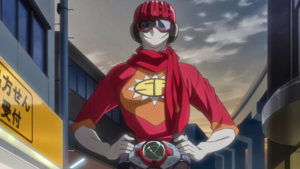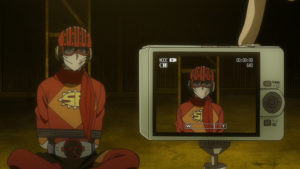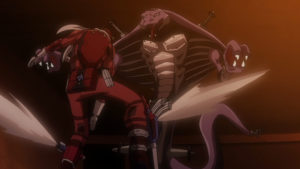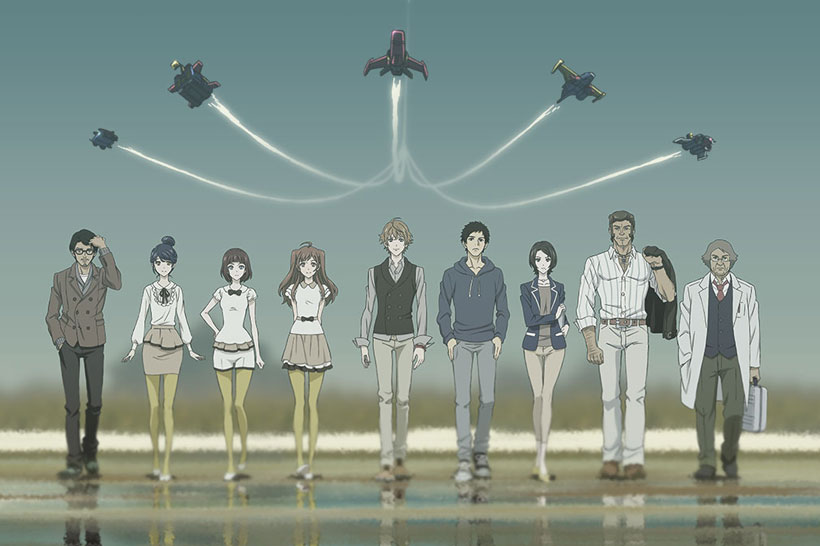Masayoshi Hazama is a model with dreams of becoming a real-life superhero, so he takes to the streets donning his superhero persona, Samurai Flamenco. But without superpowers or a fancy crime fighting suit, Masayoshi has to start small, and spends his nights targeting teenage loiterers, litterbugs, and purse snatchers. While performing his heroic duties, Masayoshi is discovered by police officer Hidenori Goto, and the two form an unlikely friendship in their pursuit of justice and navigation of the world of vigilantism.

Samurai Flamenco is a very engaging series, with a memorable main cast and a solid setup. Masayoshi is an interesting protagonist with an unwavering perspective on the meaning of justice, which puts him in plenty of perilous situations when he bites off more than he can chew. Hidenori is more grounded in his views, so the two balance each other out and towards the beginning of the show and make a great team as they help each other with information and when Hidenori bails Masayoshi out of dangerous situations. Things get a little more complicated when the two meet Mari, another vigilante with a different and much more violent definition of justice. From here the show follows Masayoshi as he meets various characters that assist him in his dream of becoming a superhero, and the different struggles he faces as he becomes a well-known public figure, interspersing moments of humour with unsettling pain and cruelty. Samurai Flamenco balances these thematic dichotomies quite well in the beginning, highlighting the public’s poor treatment of Masayoshi when dressed as Samurai Flamenco as an outcome of the bounty placed on his head by media sources after his true identity.

The show begins to fall apart around the end of episode seven, when the episodes shift focus from the vigilante superhero origin story into something a little more ridiculous. Without too many spoilers, basically things get very absurd, very quickly and the villains are no longer purse snatchers, but villains similar to those featured in the old superhero shows Masayoshi loves. A friend of mine summed up the reaction to this change quite eloquently: the sudden shift in the show is like being thrown a wrench and being expected to catch it with your teeth. It’s unexpected, jarring, and it’s really cool if you can pull it off, but it’s hard to enjoy anything in the aftermath when you’re in pain and your mouth is full of broken teeth.
If I could sum up the series in one word, it would be ‘escalation’. Samurai Flamenco starts off in a workable and relatively grounded universe, showing us a brand of vigilante heroism with consequences. From there, the show escalates nonstop, rarely letting you catch your breath or understand how or why things are occurring. I won’t deny that there is an in-universe explanation for the events that take place, simply that the excess of it left me stunned and emotionally confused. In fact there’s actually a lot to enjoy if this kind of wackiness is up your alley, and you’re in the mood for heightened drama and cheese with a little bit of dark drama.

Samurai Flamenco is a strange series, because according to the show’s in-universe logic the constant escalating fantastical events make complete sense. The weirdness is stylistic but also 100% part of the story, similar to how I understand the series Space Dandy operates. I think the main issue here is that Samurai Flamenco‘s initial premise, of a group of relatively normal (if eccentric) people committing themselves to vigilante heroism and suffering the various consequences of that, is simply too engaging from the offset. So when Masayoshi suddenly starts fighting a gorilla with a guillotine where his stomach should be and the city is littered with literal cartoon villains (albeit, slightly more violent in disturbing ways cartoon villains…) it’s such a shock that it’s difficult to accept the new direction the show is taking. That said, there is value to be had from Samurai Flamenco, especially if thematic twists don’t deter you and you find continuous escalation hilarious.
A review copy was provided by Madman Entertainment to the author for the purpose of this review.
© manglobe/Project Samumenco





